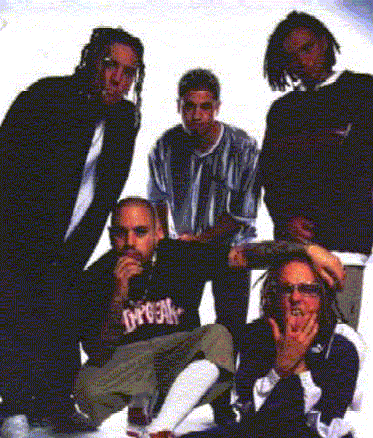
Exclusive Interview

TASTE SOME NEW
KORN!
KoRn in the studio
Story originally by Corey Levitan
"What?!" David Silveria
shouts back. The drummer for Korn has just been asked whether
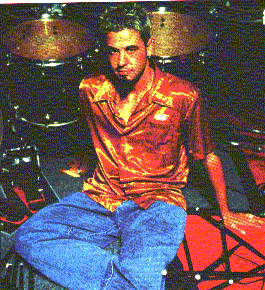 Follow the Leader (Korn's new album to be released
on August 18), described by insiders ,is more melodic than his band's forst
two albums that might actually compare to Metallica's so-dubbed "Black" album.
Follow the Leader (Korn's new album to be released
on August 18), described by insiders ,is more melodic than his band's forst
two albums that might actually compare to Metallica's so-dubbed "Black" album.
«David Silveria "No way!" says Silveria, defending his bands new CD, on Immortal/Epic Records, against the perceived attack. "This shit is still hardcore! It's more like the first record than the second!"
It is a spring morning outside NRG Studios in LA's San Franando Valley and Silveria and his band mates-singer Jonathan Davis, guitarist James "Munky" Shaffer, Brian "Head" Welch, and bassist Reggie "Fieldy" Arvizu-are suffering from textbook effects of stress.
After being rushed through its first two albums, Korn has taken its time with Follow the Leader, logging two months of pre-production and making sure to get it right in the studio.
But that doesn't make the bands's 15-hour work days any less exhausting. Having compleated basic recording, the band is now focused on mixing. This is a gruling process during which the recorded songs are played back, over and over, to facilitate a perfect balance of vocal and insturmental levels.
In addition, never far from mind is planning for "Korn's After-School Special," the band's (since compleated) run of seven weekly Internet broadcasts from the studio. And Korn takes regular meetings with its two managers on the status of its fall hard-rock tour, Family Values, and its new Reprise-distributed lable, Elementree Records. As of this interview, only Orgy and Limp Bizkit were confermed for Family Values.
Silveria scratches his goatee and reconciders his previous outburst. It doesn't sit well with the 27-year-old, who eight months ago became a father and seems to hyper-attuned to his general temperment. He adds that David Jr. has been getting him up way earlier each morning than he would like.
"It's just that the songs make a little more sence in
the writing structures," Silveria says, "It's a little more musical. But
it's not going light at all. These songs jave have the phattest grooves
we've ever done." Fieldy, who is also hanging outside the studio, calls
Follow the Leader a "late 90's version" of Korn's self-titaled 1994
debut album. "We're using a lot more riffs go and
 the grooves, they're slowed down a lot and really
heavy. Why don't you go inside and have a listen?"
the grooves, they're slowed down a lot and really
heavy. Why don't you go inside and have a listen?"
Inside, one entire wall is strews with nude pictures of women with men, women with women, and men with men. (One comuter-rendered animation has Scobby-Doo taking on Daphne, you-know-what-style.) There are also pinups of the bands faces, from Circus Magazine, tattoo magazines and the like. Not one photo remains unappended by magic-marker whiskers, horns, and spiky hair. Fieldy»
Walking through the glass doors of NRG, one gets the feeling that the inmates have taken over the asylum. It is your typical big-bucks studio-bars lined with liquor, walls with expensive paintings and rooms with high-tech gadgets. Lams blink, for instance, to let artists know when someone's calling. But NRG's Studio B is now overrun by a dozen men with shaved heads and wallet chains, scurring this way with a guitar case, and that way with a case of "ice coldies" (Korn slang for beer). Recent NRG clients include Rancid, 311, No Doubt, and Hootie and the Blowfish, a diversity of sound, but a consistency of stature: All have graduated from cult obscurity to commercial viability. It is as if the members of Korn have put their own stamp on NRG just to assert how much they don't jibe with that list.
Davis and Head are currently ensconced in the control room, whose big wooden door is plasured with neglected phone message slips. "To Jonathan.From: Lazy.#: You have it," reads one.
New producer Steve Thompson, who replaces Ross Robinson,
is playing them the Follow the Leader mixes so far compleated.
"Give me somethinbg real!" a gruff Davis vocal shouts at
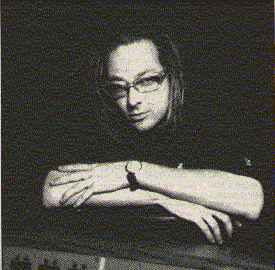 inhumanely high volume. Digital
numbers whir by on computers, rack effects and tape machines. Davis,
his dreads dangling against his black T-shirt, listens to the playback with
clasped hands to his face. Head, in ever-present Adidas gear, twitches
his tattooed arms to the jackhammering beats.
inhumanely high volume. Digital
numbers whir by on computers, rack effects and tape machines. Davis,
his dreads dangling against his black T-shirt, listens to the playback with
clasped hands to his face. Head, in ever-present Adidas gear, twitches
his tattooed arms to the jackhammering beats.
«Jonathan Davis The song is tentatively titaled "Watch Me Faggot." Neighborhood kids used to taunt Davis with the slur during his childhood in Bakersfield CA, the small desert town that sprouted all the Kornsters. Davis was outcast for listening to Duran Duran, wearing makeup and playing the bagpipes. He first railed against the echoes of this crulity on " Fagot," from Korn's first album.
When the atonal din segues into the ear-ringing that
indicated the new song's conclusion, Davis asks Thompson about the possibility
of inserting a sample of dom DeLuise's "Stick out your tush" song (from the
movie "Blazing Saddles") into the introduction. Thompson, a muscular
man who looks more like the bouncer at a college bar than the fromer helmsman
for
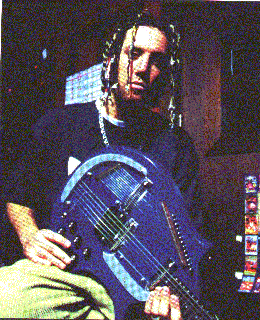 Guns N' Roses and Metallica, laughts before nodding
his approval.
Guns N' Roses and Metallica, laughts before nodding
his approval.
Another song follows, at even deadlier volume. "All in the Family" features Davis and limp Bizkit singer Fred Durst trading barbs in an old school hip-hop duel. "You look like one of those dancers in the Hanson video!" Davis shouts. "You call yourself a singer?" Durst responds. "Your favorite band is Winger!" Eventually, the warring frontmen reach a detente. "I hate you and you have me," the real-life buds scream as one. "You know what? It's all in the family!" Head»
"That was really fun to do," Davis says after the song concludes and introductions are made. "Me and Fred were just roasting each other, saying shit we've always wanted to say." The singer laughts maniacally.
The next song up is "My Gift to You." Fans have expressed concern over what the band has referred to on "Korn's After-Schoole Special" as a ballad. Davis disagrees. "It IS a love song," he says. "It's about my fantasy of fucking my chick and killing her." Davis has been living for several years with Renee Perez, mother of his two and-a-half year old boy, Nathan.
"Me and her used to do this thing there she'd leave a note on my pillow-10 ways she'd like to kill me," he elaborates. "It's like a sicko fetish. I don't know, we're weird or whatever. But she was always bitching, 'Why don't you write me a love song?' I'm like, OK, here. I wanna fuck you and kill you.'"
A loud shard of guitar noise breaks Davis' thought train. Head has begun laying down guitar overdubs fro another track, tentatively titled "Camel" or "The Camel Song."
Realizing the futility of concentrating in his current surroundings, Davis suggests that the interview continue outdoors, in the sun. (Although Korn doesn't seem like an outdoor kind of band, they all have houses or apartments in beach communities and hour south of L.A.-Davis and fieldy in Long Beach, Head in Redondo Beach, Munky in Hermosa Beach, and Silveria in Huntington Beach.
On the way out, Davis walks through NRG's cavernous main
studio. It is domonated by his local area, which is condoned off by
votive condles in front and opaque screens in the back. The screens
are marked with masking tape spelling "Mr. Davis", the "R" facing backwords
a la
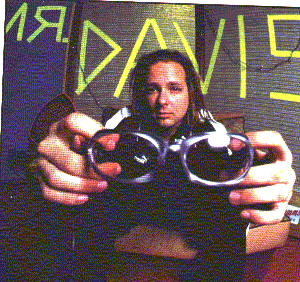 Korn's logo. To make himself at home, Davis
has decorated the studio with a fluffy old chair, and ottoman, a coffe table,
a lamp, and a potted dracaena fragrans (a corn plant). Flanking his
microphone are two music stands. The one titled to the horizontal holds
a singer's array of essentuals: honey, breath ments, and a smoking tray.
The one tilted upright holds lyric sheets for a dozen or so songs slated
for the new album. The song titles on these sheets-all tentative and
none guaranteed to make it to disc- include "Justin," "Sometimes," "Come
On," "Deacide," "Corigan," "Saints," "Big Black Kock," and "Earache My Eye."
(The last is an old song by Cheech and Chong, reprised just a day earlier
by Davis with Cheech himself, who these days is a serious actor).
Korn's logo. To make himself at home, Davis
has decorated the studio with a fluffy old chair, and ottoman, a coffe table,
a lamp, and a potted dracaena fragrans (a corn plant). Flanking his
microphone are two music stands. The one titled to the horizontal holds
a singer's array of essentuals: honey, breath ments, and a smoking tray.
The one tilted upright holds lyric sheets for a dozen or so songs slated
for the new album. The song titles on these sheets-all tentative and
none guaranteed to make it to disc- include "Justin," "Sometimes," "Come
On," "Deacide," "Corigan," "Saints," "Big Black Kock," and "Earache My Eye."
(The last is an old song by Cheech and Chong, reprised just a day earlier
by Davis with Cheech himself, who these days is a serious actor).
Davis is moved to discuss "Justin," the first song written for the album. The song is about a 16 year-old boy with colon cancer. His dream to meet Korn came true via the Make-A-Wish foundation. "It was like...would your last wish be to meet us?" Davis says. "We're just a band. I know we have an impact on people's lives, but that wwas just so heavy for me. So we wrote a song about it" Davis says he still keeps in touch with Justin. "We call him in the hospital. He's always so drugged up, and he goes, 'Oh my God! You guys are calling me!' Concludes Davis. "It's really cool, but...it's really heavy."
Once outside the studio, Davis settles on a patch of gravel beneath a basketball hoop in the parking lot. He crouches down, the sun glinting off his orange-hued glasses. Now out of earshot of Thompson, he is asked about the change of producers on Follow the Leader. "The deal with Ross is nothing personal," he says. "We still love him and we're still really good friends, but we just wanted to do something different this time. We can't stay the some; it's getting boring. We were scared shitless about doing it, but it turned out to be the right thing to do."
In an earlier interview, Thompson echoed that "everybody needs a change now and then. I wouldn't work with the same band a million times."
"A new kind of heavy" is how Davis describes the resulting sound. "It's crushing," he says, "like a perfect marrage of Korn and Life is Peachy (Korn's second album from 1996). Although reports of Davis' trademark screaming has toned down were laid to waste by three songs unpooled in the control room, Davis cops to mellowing a bit. "There's only so much that I can scream about," the 27 year-old says, "although I am still angry about some thing. Like on this album a couple of songs address how parents tell their kids what to be in life." Davis ha sfirst hand experience with this issue. His folks constantly discouraged his musical pursuits as a teen. "They started getting supportave when I started getting bigger," Davis says, "when I got in this band and stuff. But before, my dad was like, 'No, you're not going to be in the music business. Do something else.'" That his father had been a keyboardest in country ater Buck Owens' band was not lost on Davis. But becoming a father himself has made Jonathan realize that the discouragement was only dispenced for his own protection.
"Now that I'm a dad, I look back and go, 'Oh, that's why he did that,'" he says. "But when you're a kid you don't understand shit. And it really freaks you out." One of Davis' freaked-out concessions to his parents was a brief career detour as an autopsy assistant in the Kern county, CA coreners's office. He was just 17 when he took the job. "My dad was really proud," he says. "It was a county job with benefits." The gig helped shape Davis' obsession with the dark side of human nature," Davis reveals. "I was working this case and saw a little firl who was 16 months old," he says, "laying on the floor dead with her legs broken up by her back because her dad picked her up and fucked her to death. I knew I had to get out there and get back to music."
The seeds on Korn were planted in 1993. Munkey
(so-nicknamed for his simian feet),
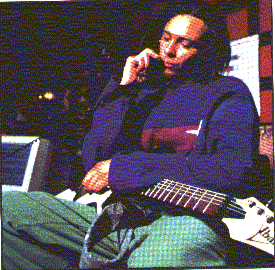 fieldy (a supposed ringer for garfield the cat)
and Silveria played with another band called Creep. Head (he of the
large head), who somethimes joined Creep onstage, traveled back to bakerfield
with Munky on weekend and caught Davis singing for a local band called Sex
Art. Within five weeks, Davis has jumped ship and Korn was born.
Munky»
fieldy (a supposed ringer for garfield the cat)
and Silveria played with another band called Creep. Head (he of the
large head), who somethimes joined Creep onstage, traveled back to bakerfield
with Munky on weekend and caught Davis singing for a local band called Sex
Art. Within five weeks, Davis has jumped ship and Korn was born.
Munky»
A subject that sets the supposedly mellowed Davis raging in the case of Eric VanHoven, a Michigan high school student who was suspended for wearing a Korn T-shirt to school earlier this year. (He is currently suing the school district). "I'm very pissed at that," Davis says. "We're in America, man. It was a little work ['Korn"] on his shirt and he can't wear that shirt? That's some Big Brother shit! But I have to thank his assistant principle for giving us all the plablisity." That plablisity, coupled with the multiplatnum success of Korn's first two albums, is likely to boost Korn to a new echelon of success with Follow the Leader. Is Davis psyched?
"It's awesome to be successful," Davis says. "But my vision of fame growing up was totally different. I grew up with the whole Motley Crew thing and I thought it was all about chicks and partying and all that other shit. It can be that, but it's not really. It's king of stagnant."
Davis says that his own partying has been back-burned by the responsibities of parenthood, in addition to his strong desire not to be the kind of father his dad was. "Back in the '70s my dad was insane," he says. "But I'm totally straight when I'm with Nathan, always, because I saw my dad stumbling all the time."
Davis concedes that he still occasionally overindulges, but that when he does, he'll cart Nathan off to Rene's. "Or I'll just stay the night at one of the guys' apartments if I'm really hung over," he says. "I call my girl and say I'm not coming home. I don't let my son see me when I'm like that at all. I don't want to look him in the eye."
As Davis finishes his statement, a fresh case of ice-coldies enters NRG, on the back of one of those buys with shaved haeds and wallet chains.